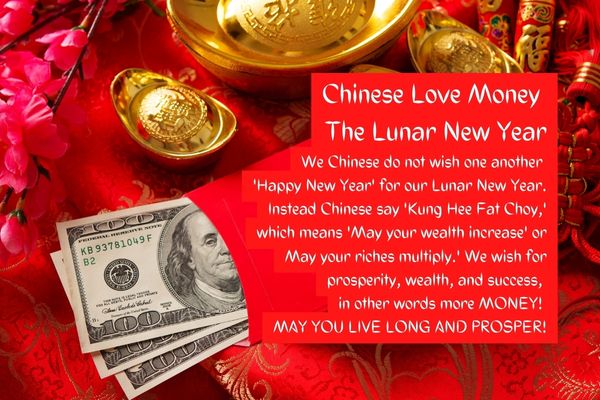Why the Chinese Love Money (All Year Round)
Let’s be honest — the Chinese love money.

We don’t even try to hide it. Money brings comfort, security, and that deep satisfaction of knowing life is in order.
Counting money is practically a cultural pastime.
Some count sheep before bed; we count bills and blessings.
Money and the Meaning of Prosperity
In Chinese culture, money isn’t just about wealth — it’s a symbol of prosperity, luck, and good fortune.
That’s why during Chinese New Year, you’ll hear wishes like Kung Hee Fat Choy or Gong Xi Fa Cai, which both mean “May your wealth increase.”
Forget “Happy New Year”; this is the greeting that truly matters.
Prosperity is something that flows through generations.
When a family does well, everyone celebrates.
When someone gets a promotion, it’s called “good luck.”
To us, wealth isn’t greed — it’s proof of hard work, discipline, and harmony at home.
Clearing Debts Before Chinese New Year
Every year before the Lunar New Year, Chinese households go into full action mode: settle every debt before midnight.
The telco bill, the water bill, even the electricity bill that comes at the worst possible time — everything must be paid.
“Aiyaahhh,” Mom would say, “the TNB meter man too early this year!”
Still, off we go to settle it.
The belief is simple — start the year clean and debt-free so new luck can flow in.
It’s a mix of tradition, superstition, and good financial sense all rolled into one.
The Ang Pow Tradition Lives On
Then come the famous red packets — the Ang Pow.
They may look small, but they carry powerful blessings.
Inside each red envelope isn’t just money, but a wish for happiness and wealth.
Married couples give them to the unmarried, parents to children, and employers to staff.
Even banks hand them out during Chinese New Year celebrations — or at least, they used to.
These days, some sundry shops try to sell Ang Pow packets, and every Malaysian Chinese Aunty reacts the same way.
“Buy Ang Pow?No need! Bank give free!”
It’s one of those cultural quirks that make us smile — some traditions should never be commercialized.
Money as a Blessing, Not Greed
When we say the Chinese love money, it’s not about greed.
Money represents stability, care, and the ability to provide.
It’s a reward for effort, not a measure of value.
To the Chinese, being thrifty, saving, and managing your finances are forms of respect — for yourself and your family.
Even home decorations reflect this love for prosperity and good fortune.
The gold Fu character (meaning fortune) is often pasted upside down — because in Chinese, “upside down” sounds like “arrived.”
It’s a fun way of saying “fortune has arrived.”
Add a money plant or a few gold coins around the house, and you’ve got yourself an auspicious start to the year.
Culture, Humor, and Everyday Luck
No story about Malaysian Chinese culture is complete without mentioning the legendary Men Riding Horse calendar.
Bright red, full of lunar details, and proudly hanging in every Aunty’s kitchen.
It’s how we track lucky days for cleaning, shopping, or starting something new.
Luck, money, and timing are woven into our daily lives — and we wouldn’t have it any other way.
Today, we may have swapped cash for e-wallets and paper Ang Pow for digital ones, but our values haven’t changed.
We still believe in working hard, saving smart, and sharing our blessings.
So the next time you wish someone Kung Hee Fat Choy, remember — you’re not just wishing them wealth.
You’re wishing them peace of mind, good fortune, and prosperity all year round.



